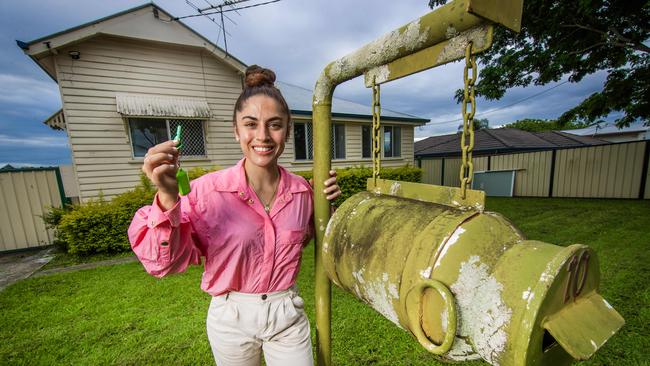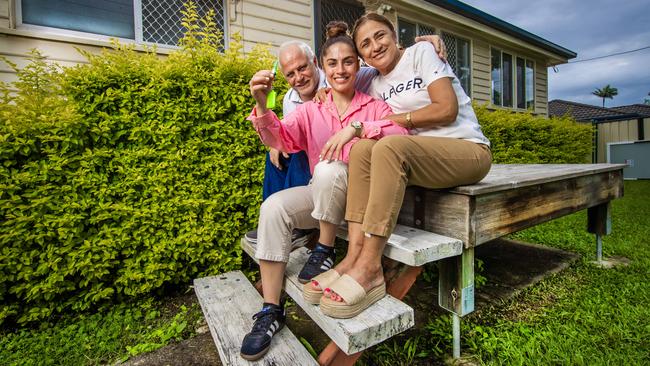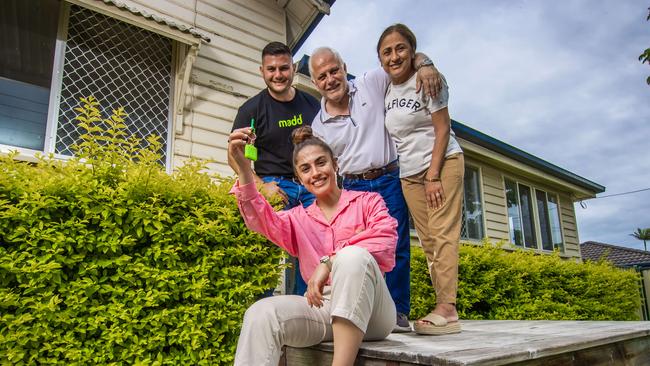$175k gain in a year: Homebuyer hack making young people rich
A 25-year-old graduate teacher is part of a growing trend young people are tapping into to hack the record housing market.

A 25-year-old graduate teacher is part of a growing trend young people are tapping into to hack the record housing market.
Alexis Iacovou has managed to buy her first house – a three bedroom property in one of the most affordable suburbs in Greater Brisbane, Woodridge – using a method that Madd Loans founder George Samios says for some people could mean they can buy without a deposit.
Ms Iacovou had a substantial deposit but needed her parents’ help in order to get her foot in the door for a house loan, rather than a unit or townhouse.
“I did have a $70,000 deposit and I still needed my parents to go guarantor,” she said given the three bedroom house she bought last year was $440,000.
MORE: 8 must-know property trends for Australia in 2025
Revealed: Jaw-dropping transformation of $1.4m wreck

The guarantee has paid off dramatically, with her property jumping in value by $175,000 since she took out the loan, which has also allowed her parents to be discharged as guarantors too – win-win for both parties.
“My parents definitely set up the process of me being able to buy in the market last year.,” she said. “Them going guarantor allowed me to be able to buy a house instead of a small townhouse or unit. I would have probably been able to purchase this year (alone) but not a stand-alone house.”
MORE: $7m price cut: Infamous Candy Shop Mansion back on market
Aussie crypto millionaires’ secret money stash
Her broker, Mr Samios – an award-winning finance specialist – said young people were not turning to the bank of mum and dad in this instance but to “the home of mum and dad” to guarantee their first home loan.
Instead of giving cash, the parents provide part of their home equity to top up the child’s cash deposit.
“Some may believe that going guarantor for your children carries a high risk, but if structured correctly, there is very little risk involved,” Mr Samios said.
Instead of raising a bigger deposit, a small second mortgage is taken out on the family home or that of whoever the guarantor is for the value of the deposit or a portion of it.
This allows their offspring to avoid mortgage lenders insurance and if the property was new construction, the borrower may even be eligible for a government grant, which would make the guarantor loan even smaller, Mr Samios said.

“Mum and dad don’t pay a cent, and when the child’s house rises in value and the two loans are under 80 per cent, the guarantor is discharged, and the guarantee is finished,” a process he says usually takes one to two years.
Ms Iacovou said if she’d waited a year to buy her current property, “it would have cost an extra $200,000 which would have meant I wouldn’t be able to (do it).”
The rise in valuation on her house means she is now keen to find a second property to buy on her own steam – without the need for her parents to be guarantors.
“I’m financially better off. Next year I’ll be able to buy a second property on my own just in the equity. I definitely wouldn’t have been able to do this without my parents.”
Mr Samios said waiting to build up a big enough deposit was costly in the current climate.
“Of course you still need to show capacity to pay the loan but it’s a way of entering the market sooner, and for mum and dad to help out.”
In the worst case scenario, he said, the borrower would sell their property and pay out the small mortgage on the parent or other guarantor’s house if something went wrong, a situation which he had not seen occur as yet.
He suggested borrowers and guarantors put a clear exit strategy in place, such as specific milestones that once met allowed the guarantor to be released from the obligation.
Originally published as $175k gain in a year: Homebuyer hack making young people rich
